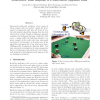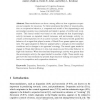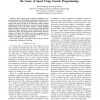144 search results - page 12 / 29 » Opponent Modeling in Poker |
ICRA
2003
IEEE
14 years 1 months ago
2003
IEEE
Adversarial multi-robot problems, where teams of robots compete with one another, require the development of approaches that span all levels of control and integrate algorithms ra...
SAB
2010
Springer
13 years 6 months ago
2010
Springer
Abstract. Neuromodulators can have a strong effect on how organisms cooperate and compete for resources. To better understand the effect of neuromodulation on cooperative behavior,...
COLCOM
2008
IEEE
14 years 2 months ago
2008
IEEE
Abstract. We describe an approach for learning the model of the opponent in spatio-temporal negotiation. We use the Children in the Rectangular Forest canonical problem as an examp...
ATAL
2010
Springer
13 years 9 months ago
2010
Springer
Planning how to interact against bounded memory and unbounded memory learning opponents needs different treatment. Thus far, however, work in this area has shown how to design pla...
CIG
2006
IEEE
14 years 1 months ago
2006
IEEE
Abstract— Many games require opponent modelling for optimal performance. The implicit learning and adaptive nature of evolutionary computation techniques offer a natural way to d...



